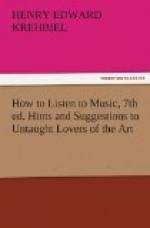As a condition precedent to the discussion of this new element in the case, I lay down the proposition that the relationship between the three factors enumerated is so intimate and so strict that the world over they rise and fall together; which means that where the people dwell who have reached the highest plane of excellence, there also are to be found the highest types of the musician and critic; and that in the degree in which the three factors, which united make up the sum of musical activity, labor harmoniously, conscientiously, and unselfishly, each striving to fulfil its mission, they advance music and further themselves, each bearing off an equal share of the good derived from the common effort. I have set the factors down in the order which they ordinarily occupy in popular discussion and which symbolizes their proper attitude toward each other and the highest potency of their collaboration. In this collaboration, as in so many others, it is conflict that brings life. Only by a surrender of their functions, one to the other, could the three apparently dissonant yet essentially harmonious factors be brought into a state of complacency; but such complacency would mean stagnation. If the published judgment on compositions and performances could always be that of the exploiting musicians, that class, at least, would read the newspapers with fewer heart-burnings; if the critics had a common mind and it were followed in concert-room and opera-house, they, as well as the musicians, would have need of fewer words of displacency and more of approbation; if, finally, it were to be brought to pass that for the public nothing but amiable diversion should flow simultaneously from platform, stage, and press, then for the public would the millennium be come. A religious philosopher can transmute Adam’s fall into a blessing, and we can recognize the wisdom of that dispensation which put enmity between the seed of Jubal, who was the “father of all such as handle the harp and pipe,” and the seed of Saul, who, I take it, is the first critic of record (and a vigorous one, too, for he accentuated his unfavorable opinion of a harper’s harping with a javelin thrust).
[Sidenote: The critic an Ishmaelite.]
[Sidenote: The critic not to be pitied.]
[Sidenote: How he might extricate himself.]
[Sidenote: The public like to be flattered.]
We are bound to recognize that between the three factors there is, ever was, and ever shall be in saecula saeculorum an irrepressible conflict, and that in the nature of things the middle factor is the Ishmaelite whose hand is raised against everybody and against whom everybody’s hand is raised. The complacency of the musician and the indifference, not to say ignorance, of the public ordinarily combine to make them allies, and the critic is, therefore, placed between two millstones, where he is vigorously rasped on both sides, and whence,




